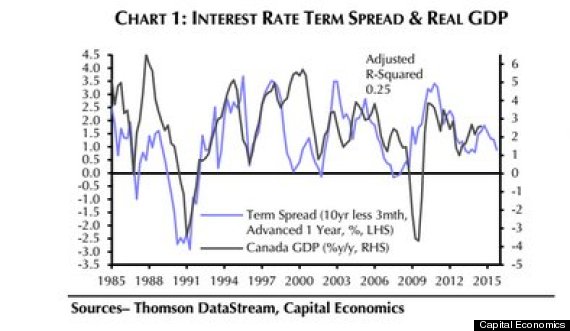 At least one economist is ready not only to use the “R-word” but has also put a number on the risk of a recession happening.
At least one economist is ready not only to use the “R-word” but has also put a number on the risk of a recession happening.
The odds of the economy falling into a recession within a year are now as high as 30 per cent, David Madani of Capital Economics wrote in a note Friday morning.
The firm, which is famously bearish on Canada’s economy, said the slump in oil prices — which have dropped more than 50 per cent since their peak in June — will hit businesses hard. That would cause a reduction in crucial business investment of as much as 30 per cent, and “that will cause ripple effects throughout the wider economy.”
Business investment accounts for about 13 per cent of overall economic growth, or GDP.
“If investment were to decline by 10 per cent before year end, that would spell trouble, possibly even a recession,” Madani wrote.
Some of the fallout from the decline in oil prices will be offset by an increase in exports thanks to the corresponding drop in the Canadian dollar, but that may not happen soon enough to prevent a downturn, he added.
Earlier this week, The Huffington Post Canada laid out eight troubling signs that Canada could be headed for a recession, including negative economic growth in November, a weak labour market and sky-high consumer debt prices.
The Bank of Canada has taken a decidedly pessimistic tone lately, preemptively lowering the overnight lending rate to 0.75 per cent, saying the decline in oil prices is “unambiguously negative” for the Canadian economy.
Madani calculated the odds of recession based on the difference between short-term and long-term interest rates, called the term spread. Historically, the term spread has been considered a reliable predictor of economic activity as GDP tends to fall along with term spreads. The method has raised red flags ahead of previous recessions.

The spread between short-term and long-term interest rates in the bond market has correctly predicted many recessions.
The term spread is currently falling, pointing to a slowdown, Madani said, adding that he believes the odds of recession are even higher than the term spread predicts.
“For starters, the importance of oil has grown substantially over the years, especially over the past five years or so. This fact may not be fully factored-in by financial markets.”
Despite a host of ominous economic trends in the past few months, many economists have been much more reluctant to speculate on the prospect of “recession,” technically defined as two consecutive quarters of negative growth. But many economic assessments are based on data that look backward in time, such as GDP and unemployment rates. Term spreads are a predictor of future activity.
Madani has predicted for four years that Canadian housing prices will fall as much as 25 per cent in the near term and recently said that low interest rates won’t prevent a crash.
Original Article
Source: huffingtonpost.ca/
Author: Sunny Freeman
No comments:
Post a Comment